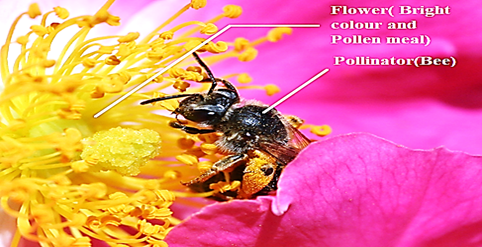
Describe the advantages and disadvantages of cross-pollination to the plant.
Answer
585k+ views
Hint: Pollination is the process of transfer of pollen grains from the male of a flower to the female stigma. The transfer of pollen from another plant to the flower of another plant is known as cross-pollination.
Complete step-by-step answer:
Pollination is important because it leads to the production of fruits and seeds which in turn can create more plants.
Advantages of cross-pollination:
- Genetics recombination- as the pollination occurs between flowers of two different plants this results in the origin of new varieties. It helps in evolution.
-The offspring produced through cross-pollination is healthy, viable, and stronger (resistant) due to hybrid vigour.
- The seeds produced in this method are in greater quantities and are more viable.
- Give higher yields if only cross-pollination is allowed to occur in numerous crop plants (such as sunflower, mustard, clover, etc.)
- Variations are produced due to cross-pollination resulting in the origin of disease-resistant plants.
- Undesirable characters of the plant can be eliminated, and the possibility to get new desirable characters.
Disadvantages of cross-pollination:
- Cross-pollination depends on the agents, hence, not always sure that the pollination may occur. Pollination may fail due to the distance barrier.
- From an economic point of view, cross-pollination is not beneficial. There is a huge waste of pollen grains in this process and the plants waste a lot of energy on various contrivances required to ensure cross-pollination.
- Flowers of the plant may have to be large, showy, scented, and have sweet nectar to attract the agents of pollination.
- Cross-pollination may introduce some undesirable characters.

Note: Elements such as animals (bees, birds, and bats, etc.), water, wind, and even plants themselves are pollinating agents. These agents help pollinate within a species or between species so that it can produce hybrid offspring in nature and plant breeding work.
Complete step-by-step answer:
Pollination is important because it leads to the production of fruits and seeds which in turn can create more plants.
Advantages of cross-pollination:
- Genetics recombination- as the pollination occurs between flowers of two different plants this results in the origin of new varieties. It helps in evolution.
-The offspring produced through cross-pollination is healthy, viable, and stronger (resistant) due to hybrid vigour.
- The seeds produced in this method are in greater quantities and are more viable.
- Give higher yields if only cross-pollination is allowed to occur in numerous crop plants (such as sunflower, mustard, clover, etc.)
- Variations are produced due to cross-pollination resulting in the origin of disease-resistant plants.
- Undesirable characters of the plant can be eliminated, and the possibility to get new desirable characters.
Disadvantages of cross-pollination:
- Cross-pollination depends on the agents, hence, not always sure that the pollination may occur. Pollination may fail due to the distance barrier.
- From an economic point of view, cross-pollination is not beneficial. There is a huge waste of pollen grains in this process and the plants waste a lot of energy on various contrivances required to ensure cross-pollination.
- Flowers of the plant may have to be large, showy, scented, and have sweet nectar to attract the agents of pollination.
- Cross-pollination may introduce some undesirable characters.

Note: Elements such as animals (bees, birds, and bats, etc.), water, wind, and even plants themselves are pollinating agents. These agents help pollinate within a species or between species so that it can produce hybrid offspring in nature and plant breeding work.
Recently Updated Pages
Master Class 11 Computer Science: Engaging Questions & Answers for Success

Master Class 11 Business Studies: Engaging Questions & Answers for Success

Master Class 11 Economics: Engaging Questions & Answers for Success

Master Class 11 English: Engaging Questions & Answers for Success

Master Class 11 Maths: Engaging Questions & Answers for Success

Master Class 11 Biology: Engaging Questions & Answers for Success

Trending doubts
One Metric ton is equal to kg A 10000 B 1000 C 100 class 11 physics CBSE

There are 720 permutations of the digits 1 2 3 4 5 class 11 maths CBSE

Discuss the various forms of bacteria class 11 biology CBSE

Draw a diagram of a plant cell and label at least eight class 11 biology CBSE

State the laws of reflection of light

10 examples of friction in our daily life




